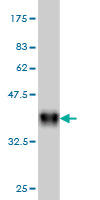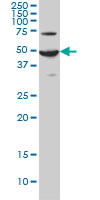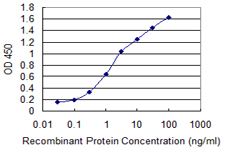ADCYAP1R1 Antibody (monoclonal) (M01)
Mouse monoclonal antibody raised against a partial recombinant ADCYAP1R1.
- SPECIFICATION
- CITATIONS
- PROTOCOLS
- BACKGROUND

Application
| WB, E |
|---|---|
| Primary Accession | P41586 |
| Other Accession | NM_001118 |
| Reactivity | Human |
| Host | mouse |
| Clonality | Monoclonal |
| Isotype | IgG1 Kappa |
| Clone Names | 2B12 |
| Calculated MW | 53314 Da |
| Gene ID | 117 |
|---|---|
| Other Names | Pituitary adenylate cyclase-activating polypeptide type I receptor, PACAP type I receptor, PACAP-R-1, PACAP-R1, ADCYAP1R1 |
| Target/Specificity | ADCYAP1R1 (NP_001109, 21 a.a. ~ 120 a.a) partial recombinant protein with GST tag. MW of the GST tag alone is 26 KDa. |
| Dilution | WB~~1:500~1000 E~~N/A |
| Format | Clear, colorless solution in phosphate buffered saline, pH 7.2 . |
| Storage | Store at -20°C or lower. Aliquot to avoid repeated freezing and thawing. |
| Precautions | ADCYAP1R1 Antibody (monoclonal) (M01) is for research use only and not for use in diagnostic or therapeutic procedures. |

Thousands of laboratories across the world have published research that depended on the performance of antibodies from Abcepta to advance their research. Check out links to articles that cite our products in major peer-reviewed journals, organized by research category.
info@abcepta.com, and receive a free "I Love Antibodies" mug.
Provided below are standard protocols that you may find useful for product applications.
Background
This gene encodes type I adenylate cyclase activating polypeptide receptor, which is a membrane-associated protein and shares significant homology with members of the glucagon/secretin receptor family. This receptor mediates diverse biological actions of adenylate cyclase activating polypeptide 1 and is positively coupled to adenylate cyclase. Alternative splicing of two exons of this gene generates four major splice variants, but their full-length nature has not been determined.
References
Vasoactive intestinal peptide (VIP) receptor expression in monocyte-derived macrophages from COPD patients. Burian B, et al. Peptides, 2010 Apr. PMID 20026142.Luteinizing hormone-stimulated pituitary adenylate cyclase-activating polypeptide system and its role in progesterone production in human luteinized granulosa cells. Park HJ, et al. Endocr J, 2010. PMID 19926922.Calmodulin interacts with PAC1 and VPAC2 receptors and regulates PACAP-induced FOS expression in human neuroblastoma cells. Falktoft B, et al. Neuropeptides, 2009 Apr. PMID 19269029.Identification of new putative susceptibility genes for several psychiatric disorders by association analysis of regulatory and non-synonymous SNPs of 306 genes involved in neurotransmission and neurodevelopment. Gratac?s M, et al. Am J Med Genet B Neuropsychiatr Genet, 2009 Sep 5. PMID 19086053.Novel stable PACAP analogs with potent activity towards the PAC1 receptor. Bourgault S, et al. Peptides, 2008 Jun. PMID 18353507.
If you have used an Abcepta product and would like to share how it has performed, please click on the "Submit Review" button and provide the requested information. Our staff will examine and post your review and contact you if needed.
If you have any additional inquiries please email technical services at tech@abcepta.com.













 Foundational characteristics of cancer include proliferation, angiogenesis, migration, evasion of apoptosis, and cellular immortality. Find key markers for these cellular processes and antibodies to detect them.
Foundational characteristics of cancer include proliferation, angiogenesis, migration, evasion of apoptosis, and cellular immortality. Find key markers for these cellular processes and antibodies to detect them. The SUMOplot™ Analysis Program predicts and scores sumoylation sites in your protein. SUMOylation is a post-translational modification involved in various cellular processes, such as nuclear-cytosolic transport, transcriptional regulation, apoptosis, protein stability, response to stress, and progression through the cell cycle.
The SUMOplot™ Analysis Program predicts and scores sumoylation sites in your protein. SUMOylation is a post-translational modification involved in various cellular processes, such as nuclear-cytosolic transport, transcriptional regulation, apoptosis, protein stability, response to stress, and progression through the cell cycle. The Autophagy Receptor Motif Plotter predicts and scores autophagy receptor binding sites in your protein. Identifying proteins connected to this pathway is critical to understanding the role of autophagy in physiological as well as pathological processes such as development, differentiation, neurodegenerative diseases, stress, infection, and cancer.
The Autophagy Receptor Motif Plotter predicts and scores autophagy receptor binding sites in your protein. Identifying proteins connected to this pathway is critical to understanding the role of autophagy in physiological as well as pathological processes such as development, differentiation, neurodegenerative diseases, stress, infection, and cancer.




